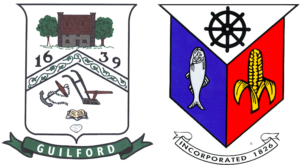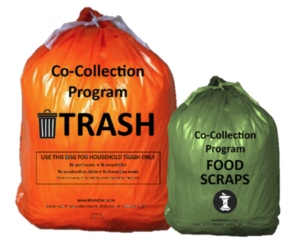
Guilford/Madison Pilot
Frequently Asked Questions

Households in the pilot program will be provided with a one-year supply of 104 orange trash bags and 52 green food scraps bags, enough for an average of two 15-gallon orange trash bags per week and one 8-gallon green food scraps bag per week to use for the duration of the pilot program. At home, residents will separate food scraps from their trash and place in the green bags. Non-recyclable trash will go in the orange bags. Each week on your regular collection day, residents will place their securely closed green and orange bags in the trash container for curbside pick up.
Participating households will receive a one-year supply of bags, enough bags for 2 orange trash bags (15-gallons each) and 1 green food scrap bag (8-gallons each) for each week of the pilot. Bags will be delivered to your home.
No. This program will not require you to change the containers you use for your trash bags. You can place both the orange trash bags and green food scraps bags together inside your trash container. Please ensure the bags are tied for disposal.
If participants need additional orange trash bags and/or green food scrap bags you may email
their request to:
Guilford – foodwaste@guilfordct.gov
Madison- walterj@madisonct.or
- A typical household bill has been reduced by over $100 annually.*
- We were able to reduce your yearly waste fee, despite the rising costs of trash across the state, by shifting the disposal cost into the price of the orange trash bags.
- This puts you in control of your trash costs. This system (Save As You Throw or SAYT) is similar to electricity where the user pays a basic amount that covers fixed costs and then a user fee (bags) for the amount used.
- Paying only for the trash that you make means you have the power to save money by recycling more and separating food scraps.
- The more you donate, re-use, reduce, recycle, and separate out food scraps, the less orange bags you buy! Save money by making less trash.
*Note this reduction is just for cart services
- A typical household bill has been reduced by over $100 annually.*
- We were able to reduce your yearly waste fee, despite the rising costs of trash across the state, by shifting the disposal cost into the price of the orange trash bags.
- This puts you in control of your trash costs. This system (Save As You Throw or SAYT) is similar to electricity where the user pays a basic amount that covers fixed costs and then a user fee (bags) for the amount used.
- Paying only for the trash that you make means you have the power to save money by recycling more and separating food scraps.
- The more you donate, re-use, reduce, recycle, and separate out food scraps, the less orange bags you buy! Save money by making less trash.
*Note this reduction is just for cart services
There are no changes to the recycling program. Please continue to place your bottles & cans, paper & cardboard in your recycling bin. Items should be clean and dry and placed loose in your bin. Questions about recycling? Learn more about recycling here.
There is no additional cost to participate in the pilot. You will be provided with an allotment of orange trash and green food scraps bags to use during the pilot. All trash must be placed in the provided orange trash bags in order to be collected and we encourage each resident to separate out food scraps and place into the green bags as best they can. With rising disposal costs, it is important to separate out food scraps and recyclables from disposal. Learn more here.
Once collected, the green food scrap bags will be separated from the orange trash bags at the transfer station facility. The green food scrap bags will then be sent to Quantum Biopower in Southington, CT. Quantum is an anaerobic digestion facility that turns food scraps into clean, renewable energy and compost, saving it from the trash can.
No. Remember, co-collection is not adding new odors to your waste stream. It is simply separating food from trash. Food scraps in separate green bags produce no more odor than when it’s not separated from the trash. Keeping a tight lid on your indoor kitchen food scrap collection bucket will keep odors out. Rinsing kitchen buckets as needed and putting food scrap bags out for weekly collection (even if they are not full) should keep odors to a minimum. In the summer, you may choose to keep food scraps in the freezer in a separate container until just before collection.
Here are some additional tips:
Seal it. Keep the lid tightly closed at all times to prevent odors and nuisance pests like fruit flies.
Cool it. Store your bin out of direct sunlight if you can, as heat can speed up smells.
Cover it. You can also add in any newsprint, food soiled paper towels, or napkins to your food scrap bag, as that might assist with any odors. Stale bread can also help here.
Freeze it. If you are finding that even with the lid the smell is off-putting, consider keeping a small container (such as a small bag or Tupperware-type bowl) in your fridge/freezer to collect the scraps before you transfer to the green bag and place out on your collection day. Nothing can stink when it is frozen! If you can’t fit all of your food waste inside the freezer, consider freezing meat and dairy scraps as they are often the smelliest.
Sprinkle it. If your kitchen pail smells, sprinkle a bit of baking soda inside to neutralize the smell.
Drain liquids before putting food scraps in your kitchen bin.
Include food soiled paper towels and napkins to help absorb liquids.
Keep food scraps in freezer until just before pickup.
Wrap meat, poultry, and fish in newspaper.
To get rid of summertime fruit flies, set a trap. Place a small bottle of cider vinegar, with a few drops of dish soap added to it, near your kitchen bin.
Place your green food scraps bag out for collection in your trash cart along with your orange bags every week, even if it is not full.
With co-collection you are just moving food scraps into a different bag. You also won’t need to take out the trash as often.
Backyard composting is great and encouraged! You may decide you want to use curbside co-collection for certain items (eggshells, meat, bones, and dairy, prepared foods) or to use in the winter.
To reduce the high cost of nitrogen processing at the wastewater treatment facility, we strongly urge residents to switch from in-sink disposals and use the curbside co-collection program for food scraps. It will also save on your water usage and produce usable fertilizer.
Reduce your food waste. Keep your refrigerator clean and organized so you know what you have before you shop. Store leftovers in clear containers so you can see what’s in them. Use a shopping list. Use your freezer. Reduce other household waste by avoiding single use disposable items and choose products with minimal packaging.
· Reuse: Use reusable shopping bags and coffee mugs. Repurpose glass jars at home. Donate household items and clothing. Consider cloth napkins.
· Recycle: Remember the basics: Recycle your paper & cardboard and empty bottles & cans. Items should be clean and dry and placed loose in your collection bin. Also, try the What’s In What’s Out tool at www.recyclect.com Type in the product you are wondering about and the tool will tell you if its recyclable.
· Compost: Place all your food scraps in the green bags! Fruits & Veggies, Eggs & Eggshells, Meat & Seafood (include bones and shells), Coffee Grounds & Tea Bags, Dairy, Pasta, Grains & Bread, Cookies, Cake, & Candy. You can also include food-soiled paper, such as napkins and paper towels, greasy pizza boxes. Please no plastic, no metal, no sanitary waste, no pet waste.
Town of Guilford, CT
For more information, please contact
Guilford Town Hall
31 Park Street
Guilford, CT 06437
(203) 453-8015
Guilford Town Hall is open Monday through Friday from 8:30am to 4:30pm
Town of Madison, CT
For more information, please contact
Madison Department of Public Works
8 Campus Drive
Madison, CT 06443
(203) 245-5611
Madison Public Works is open Monday through Thursday from 8:30am to 4pm. Friday from 8:30am-noon.